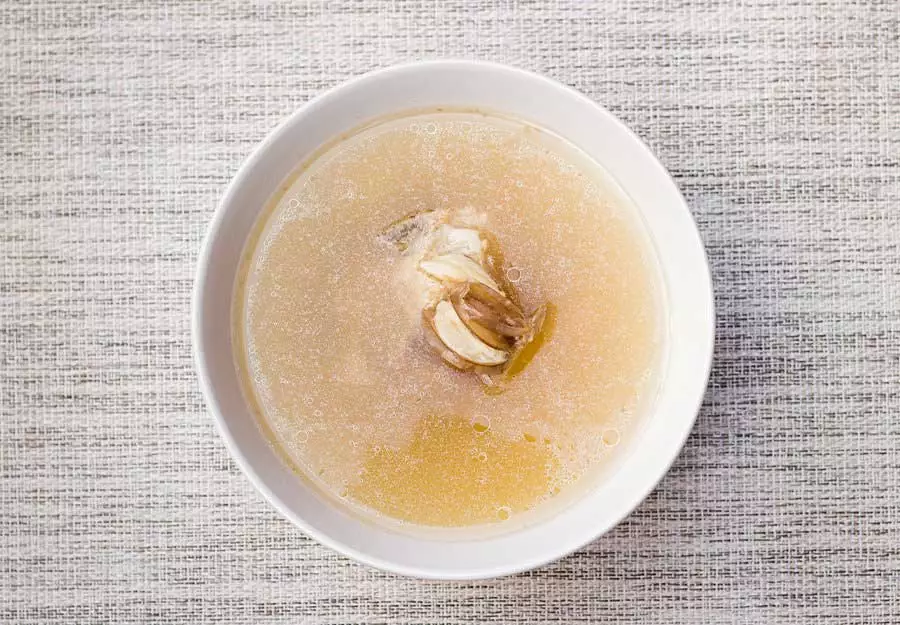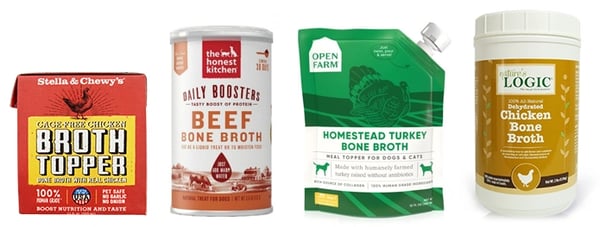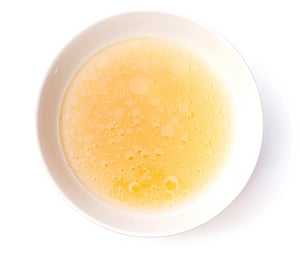
If you are looking for a tasty new way to add more flavour and nutrition to your dog's diet, then bone broth might just be the right choice! Learn about the benefits of bone broth for dogs and get fun and customizable bone broth recipes for dogs.
A nice warm bowl of chicken soup is one of the most soothing human foods, but how about something your dog can eat too?Bone broth is a dog-friendly snack and meal topper that offers an excellent way to promote skin and coat health, boost immunity, and support hips and joints in ageing dogs. All you need is some raw marrow-filled bones, a slow cooker, and your pet's favourite veggies and natural supplements.
We took a deep dive into the benefits of bone broth for dogs so that you can offer your dog all of the benefits of this amazing superfood.
What is Bone Broth?
Bone broth is a growing trend in health foods for humans, but you can buy or make bone broth for dogs too. If you're not quite familiar with bone broth, it's similar to regular soup broth, but it's made from bones instead of meat. Bone broth for dogs is made the same way as broth for humans, but it strictly uses ingredients that are safe for dogs and provides flavour and nutritional value.
Bone broth is a nutrient-packed, flavourful, and thick broth that makes a delicious meal topper or can be used in a variety of homemade dog treat recipes, like frozen dog treats.
The collagen in animal bones makes bone broth thicker than traditional broths and more nutrient-dense, which is why bone broth is a better choice for boosting your dog’s meals.
Best Store-Bought Bone Broth for Dogs

There are plenty of ready-made, store-bought bone broths for you to test out. These are a great way to test the waters and experiment with adding bone broth to your dog’s diet. Here are a few of our favourite ready-made bone broths:
If you are looking for something more shelf-stable, try a bone broth powder for dogs that you can make by rehydrating it with water. This is convenient for more intermittent feeding, as you can make just as much as you need at a time. Try out the best bone broth powder for dogs:
These are a quick and easy way to offer the benefits of bone broth, but nothing replaces the nutrition and customization of homemade bone broth for dogs.
Benefits of Bone Broth for Dogs

Is bone broth good for dogs? Can dogs eat bone broth? Yes! Bone broth for dogs isn’t medicinal, it’s food, but we know that food fuels life. Nutritious treats like bone broth are an excellent way to improve your dog's diet.
Feeding bone broth to your dog can support their overall health. Here are a few of the benefits of bone broth for dogs:
1. Collagen
Collagen is the most abundant protein in the body. About one-third of the protein in your dog’s body is collagen. Feeding your dog collagen from cooked bones will positively affect mobility, skin and coat, and digestion.
Collagen can improve mobility in dogs afflicted with arthritis by lubricating and protecting connective tissues. It can also help to replenish your dog's natural collagen levels.
Collagen is what gives your dog's skin its healthy elasticity. Dogs with healthy skin collagen levels tend to shed less, itch less, and have softer, shinier coats.
Lastly, collagen can help to support your dog's digestion by soothing and repairing tissues in your dog's intestinal lining that prevent bacteria, toxins, and undigested nutrients from passing into the bloodstream. Collagen is a common holistic approach to managing leaky gut syndrome.
2. Nutrient-rich
Even without all the extras and add-ons, bone broth is loaded with essential vitamins and minerals. In addition to the joint protective benefits of collagen, bone broth also supplies a healthy dose of silicon, calcium, and phosphorus. These three nutrients support your dog’s bones and joints by improving bone density and supporting growing puppies and ageing dogs.
Other key nutrients in bone broth are magnesium and sulphur. These are both macro minerals, meaning they are required in larger quantities than other minerals. They are used to support heart health and your dog’s immune system.
3. Moisture
We talk a lot about the importance of moisture. It comes up almost every time we talk about nutrition. Moisture is the mechanism through which nutrients travel through your dog’s body, so it’s an absolutely vital part of your dog’s diet.
Fresh, clean drinking water is very important, but some dogs need some encouragement to get enough moisture every day. Foods like broth bones for dogs offer extra moisture that can help prevent dehydration and support overall health.
Bone broth can be fed alone but is also an excellent way to add more moisture to a dry kibble diet.
4. Tasty
The most nutrient-dense, healthy food won’t do any good if your dog won’t eat it. The good news is that bone broth for dogs is a crowd-pleaser. This delicious delicacy can be a great meal topper for picky eaters, toothless dogs, and dogs recovering from illness.
How to Make Bone Broth
Making your own bone broth allows you to customize your recipe to your dog’s unique preferences and needs. Check out this simple bone broth recipe for dogs, starting with a base of healthy, nutrient-dense raw bones:

*While garlic can offer a variety of benefits for dogs when used therapeutically, it is best to feed in small doses and less frequently than other whole food supplements. Ingredients like turmeric or kelp are safer options if you plan to feed bone broth daily.
What are the Best Bones to Use in Your Bone Broth?
So you want to make your own bone broth, but what type of bones should you use? You can use just about any bones, but some are better than others. Here are the best types of bones to use in your next bone broth recipe:
-
- Marrow Bones
- Knuckle Bones
- Kneecaps or shoulders
- Neck, feet, and backs
Bones from your local pet store work well because they are the most suitable cuts for dogs. If you go to a butcher, ask for soup bones for senior dogs. These are the leftover cuts that don’t have enough meat left for anything other than bone broth or stock.
The types of bones you use will affect the nutrients of your broth. Remember that you want lots of collagen, so choose bones that offer the most amount of connective tissues and marrow for a more nutrient-dense bone broth.
Ways to Feed Bone Broth
Bone broth is incredibly tasting and nutritious, so most dogs won’t be too fussy about how you offer it to them. Most dogs will happily lap this delicious broth right out of the pot if you’d let them, but we’ll give you a few easy ways to add bone broth to your dog’s diet.
Meal Topper
Recommended for picky eaters and dogs mainly eating dry food, using bone broth as a meal topper is an excellent way to add flavour and moisture to your dog’s meals. Just spoon a few tbsp on top of Fido’s meals.
Rehydration
If you feed dehydrated or freeze-dried food, you can use some watered-down bone broth to rehydrate the food. This is a great way to sneak extra nutrients into your dog’s daily diet.
Frozen Dog Treats
If you like to get creative and make your dog tasty frozen snacks, then bone broth is an excellent addition to any recipe. If you’ve never made them before, you can start by simply freezing bone broth into an ice cube tray.
Medicine Masker
If your dog takes regular medication or supplements, he may not be thrilled to take his daily dose. Bone broth is so tasty that it can easily hide bad-tasting medications. Stir in any powdered or liquid medications once your broth is cooled and ready to serve. Your pooch won’t even know it’s in there.
10 Unique Bone Broth Add-Ins to Boost Your Dog’s Health
Now that you have a foundational recipe, it’s time to make this recipe the most beneficial to your dog. Here are 10 ways to customize your bone broth recipe:

1. Immune System – Kelp + Turmeric
Boosting your dog’s immune system can have whole-body benefits.
Kelp is nature’s multivitamin, supplying trace amounts of all your dog’s essential vitamins, minerals, and most amino acids.
Turmeric, the trendiest spice, is a powerful anti-inflammatory and antioxidant. Its anti-inflammatory effects can support digestion, where the bulk of your dog’s immune response occurs, and antioxidants fight off disease-causing free radical cells.
Find out what else Turmeric can do in Turmeric for Dogs: Spice Up Your Dog’s Health.
2. Brain Food – Flaxseed + Sardines
The energy needed to fuel your dog’s brain comes from fats and oils, specifically from fatty acids like omega 3 and 6 fatty acids.
Both flaxseed oil and sardines contain omega 3 and 6 fatty acids, including EPA, DHA, and LA, which are vital in supporting cognitive function, among other key systems in the body.
Want to learn more about the benefits of sardines? Check out Can Dogs Eat Sardines?
3. Calming – Chamomile + Valerian
For dogs that are naturally anxious or overly excitable, these natural herbs can be used to help calm them. Both botanicals are said to have mild sedative effects, helping to calm dogs both mentally and physically.
Always ensure appropriate dosage when using valerian and chamomile. The general rule is that they can have about ¼ tsp for every 30 lbs. of body weight. This means you may only need a few teaspoons of each for the entire batch.
4. Digestion – Pumpkin + Ginger
Whether you are treating acute digestive issues, a recurring problem, or just acting preventatively, supporting your dog’s digestion is vital for his overall health.
Pumpkin is an excellent source of fibre and helps regulate the speed of digestion while acting as a bulking agent to improve stool quality. Check out 10 Health Benefits of Pumpkin for Dogs to learn more.
Ginger is a well-known anti-nauseant, but you might not know that it also stimulates motility in the stomach. This can prevent serious digestive problems like bloat.
5. Mobility – Green Lipped Mussel + Turmeric
As a natural source of glucosamine and chondroitin, green-lipped mussel is an excellent way to support joint health by protecting the connective tissues and kick-starting the repair of already damaged tissue. This can reduce pain and improve mobility, especially in dogs that suffer from arthritis and hip dysplasia.
Additionally, stick to knucklebones with plenty of connective tissue attached, as the extra collagen will help lubricate the joints, further preventing wear and tear.
Turmeric, in this case, is used for its powerful anti-inflammatory properties. Reducing inflammation around the joints helps to prevent further damage and reduce pain. This will also help to speed up the healing process.
6. Skin and Coat – Sardines + Chia Seeds
Caring for your dog’s skin and coat reduces itchiness, shedding, hot spots, and even body odour. While many topical treatments can help, the best way to support skin and coat health is from the inside.
Omega fatty acids in sardines condition your dog’s skin and coat and their anti-inflammatory properties help reduce reactions from food and environmental allergies.
Chia seeds are loaded with nutrients. Of course, the omega fatty acids help support your dog’s skin, but when combined with antioxidants and plentiful nutrients, chia seeds are a powerhouse superfood.
Whole seeds can be difficult to digest, but soaking them in your bone broth while it cools makes the nutrients much easier for your dog to process.
7. Urinary Care – Parsley + Cranberry
Your dog’s urinary health is often not considered until a problem arises. Act preventatively to protect your pet from common urinary tract issues, like infections, crystals, and stones.
Parsley is a natural diuretic, meaning it makes your dog pee more. This helps flush bacteria and toxins from the kidneys and bladder that could otherwise lead to infection or irritation.
Cranberry is a well-known home remedy for UTIs. It works by preventing bacteria from adhering and collecting on the lining of your dog’s bladder. Its antioxidants also help defend the urinary tract from free radical cells and carcinogens that are being flushed through the bladder.
8. Detox – Kale + Milk Thistle
This detox bone broth is a great recipe to rotate into your dog’s normal supplement routine. Detoxing can be done a few times per year to help clear out some of the toxins that build up in your dog’s liver over time. These toxins come from dog food and their environment and are filtered out by the liver during digestion, but not all toxins are properly excreted from your dog’s body.
A popular herbal liver detox is milk thistle. The flavonoid compound in milk thistle, called silymarin, helps to flush out toxins. Its antioxidant properties also help to defend your dog’s body from disease-causing free radical cells and carcinogens.
In addition to its high vitamin C and K content, kale contains sulphur and glucosinolates that help to expel toxins and encourage the production of detoxifying enzymes in the body.
Learn more about using milk thistle to boost your dog's health in Milk Thistle for Dogs.
9. Protein Boost – Quinoa + Sweet Potatoes
When we work out, it’s important to eat healthy, but to provide appropriate energy and build muscle, we need an extra protein boost. So does your dog. Make your dog’s bone broth into a high-protein supplement by adding quinoa and sweet potatoes.
Quinoa is one of the few plant-based proteins that is considered a complete protein. This means it contains all 10 of the essential amino acids that your dog needs to build and maintain healthy muscle.
Building protein takes more than just protein; it also requires energy. Sweet potatoes offer some protein, but the complex carbs in sweet potatoes also provide energy to allow your dog to build muscle and maintain appropriate physical activity.
10. Bad Breath – Parsley + Peppermint
Dog breath is one of the most common complaints among pet owners. This bone broth recipe can help to freshen your pet’s nasty puppy breath and leave them with healthier teeth and gums.
Both parsley and peppermint help eliminate bacteria in your dog’s mouth that can cause bad dog breath and lead to plaque build-up. Reducing oral bacteria can prevent inflammation in the gums and improve overall dental health.
This handy recipe won’t replace your dog’s regular dental routines, like toothbrushing, but it’s a great way to compliment it and make those sloppy dog kisses a little more tolerable.
Frequently Asked Questions About Bone Broth for Dogs
What is bone broth for dogs?
Bone broth for dogs is a nutrient-rich liquid made by simmering animal bones, often combined with vegetables and herbs, to extract minerals, collagen, and other beneficial compounds. It's used as a supplement or treat for dogs.
Is bone broth safe for dogs to consume?
Yes, bone broth is generally safe for dogs when prepared properly. However, it's essential to avoid using ingredients that are toxic to dogs, such as onions. Homemade bone broth without added salt or seasonings is preferable.
What are the benefits of giving bone broth to dogs?
Bone broth offers several potential benefits for dogs, including providing essential nutrients like collagen, amino acids, and minerals that support joint health, digestion, and overall wellness. Using bone broth can also encourage hydration.
Can I give my dog store-bought bone broth?
You can find store-bought bone broth specifically formulated for dogs at Homes Alive Pets. Make sure to read the ingredients list and choose products without added salt, seasonings, or any harmful additives.
How can I use bone broth for my dog?
Bone broth can be served as a treat, poured over your dog's regular food, or used to make frozen treats by freezing it into ice cube trays. Some pet owners also use bone broth to moisten dry kibble, as a food topper, or encourage picky eaters to enjoy their meals.
Are there any precautions when feeding bone broth to dogs?
While bone broth is generally safe, it's essential to avoid giving excessive amounts, as it can be calorie-dense. If you're introducing bone broth to your dog's diet for the first time, start with a small amount to ensure your doggo tolerates it well.
Is Chicken Broth Good for Dogs?
Bone broth is typically better, but regular broth can also be healthy for dogs. Just be very aware of the ingredients. Broths made for humans, like premade soup bases and canned broths, almost always have added ingredients that can be harmful to dogs, like onion, high salt content, and other spices. If you want to share some homemade chicken broth with your dog, stick to plain, unseasoned broth only.
Is Beef Stock OK for Dogs?
Beef stock is basically beef bone broth. If you make your own beef stock at home, you can share it with your pet, so long as you leave out the spices and seasonings. Beef broth for dogs is also safe, but like chicken broth, beef broth lacks many of the nutrients that are abundant in bone broth.
.png?width=200&height=66&name=logo%20(1).png)





.jpg)
